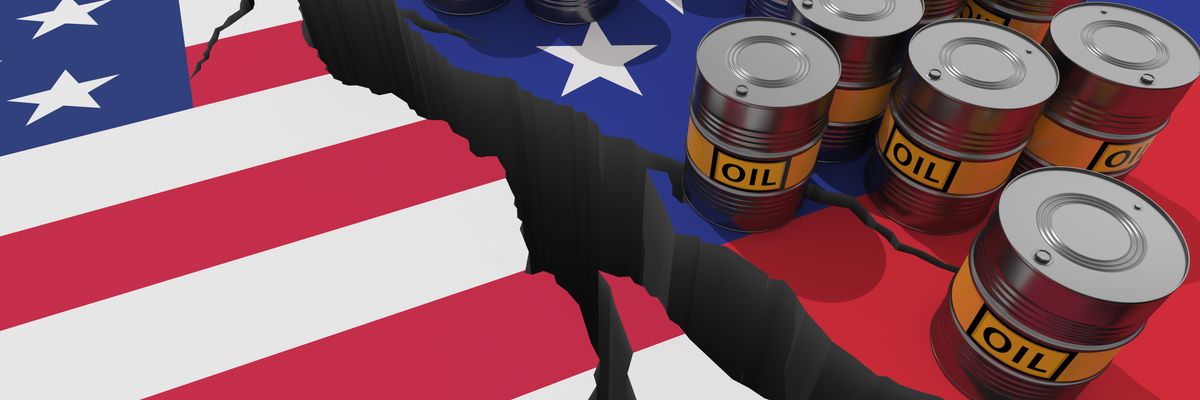Russia’s war in Ukraine, inflation, and the supply chain crisis have conspired to create logistical and cost nightmares across the world.
The United States has successfully rallied most of NATO but has failed to convince much of the rest of the world that the rightness of its cause trumps various far-flung national interests. Throughout all of this, the price of oil increases, something that, if it continues for much longer, could increase social instability in many countries. Saudi Arabia and other Gulf monarchies, meanwhile, are playing a game of hard to get with Washington, hoping for political concessions it is not in the U.S. interest to give.
Venezuela, however, remains an untapped resource for Washington’s current woes. Sitting comfortably just across the Caribbean and with some of the largest oil reserves in the world, Caracas could be just the partner Washington needs to ease some of its present difficulties.
However, standing in the way are incredibly tense relations between the two countries based on two decades of hostility and rooted in an outdated U.S. regime change policy. The election of Hugo Chavez in 1998 under the promise of reorienting Venezuela’s previously servile relationship with the United States, along with the various subsequent U.S. attempts to remove and undermine him, set the stage for a gradually deteriorating bilateral relationship that reached new lows with the severing of diplomatic relations in 2019 after the collapse of opposition leader Juan Guaido’s challenge to the rule of Nicholas Maduro and the Trump administration’s recognition of Guaido as Venezuela’s leader.
A farcical and amateurish coup launched by a handful of private contractors in 2020 only served to see multiple people apprehended by Venezuelan authorities shortly after landing on the coast. Meanwhile, crippling U.S. sanctions have had little effect in dislodging Venezuela’s ruling party.
Since then, Guaido’s oppositional “government” has largely languished as an increasingly embarrassing artifact of this ongoing rivalry, with few countries (much less Venezuelans) recognizing his legitimacy. Even Speaker of the House Nancy Pelosi, who once praised Guaido’s courage now appears no longer willing to acknowledge his existence. With attachment to Guaido fading, Washington should now disavow interference in Caracas’s internal affairs and offer sanctions relief as an easy price to pay for setting up a full and robust exchange of commerce, oil, and gas between Venezuela and the United States.
In order to accomplish this abrupt policy turn, Washington must first cease efforts to negotiate through the Guaido-led opposition and instead deal solely with the actual government under Maduro. This would be an admission of Venezuelan sovereignty over its own internal affairs that has been missing from so much of the recent bilateral relations between the two countries. Since the core issue of Caracas’s suspicion of Washington is one of security and fear of foreign interference, simply setting up the parameters for normalized bilateral engagement would go a long way towards moving the relationship forward.
Already, the Biden administration seems willing to at least tease some limited sanctions relief to entice talks, but if it went much further, perhaps by offering full sanctions relief in stages based on compliance with U.S. trade norms, it could meet much greater chances at success. A bolder turn in this direction would be hard for the economically besieged government in Caracas to reject, as Venezuela’s economy is heavily dependent on exporting oil and gas and requires many imports from abroad to sustain its internal commerce in other sectors. The proximity of the world’s largest economy to this resource rich trading partner implies a mutually beneficial economic relationship could grow regardless of political differences in other sectors.
Venezuela’s posturing on the global stage with other U.S. rivals means little, as there is no danger of Caracas and, say, Tehran, working in concert to undermine U.S. global objectives. Furthermore, it is the shared hostility they face from Washington more than any actual convergent interests that causes these Iran and Venezuela to express support for each other. Showing diplomatic progress with one through sanctions relief might well increase Washington’s leverage with the other for future negotiations and divide their publicly expressed solidarity.
With U.S. influence seeming to decline even in its relative backyard of the Western Hemisphere, as well as the recent Columbian elections altering regional dynamics, it makes sense to have more economic and diplomatic links in the region rather than less. The sooner Washington gives up its dream of engineering its preferred outcome in Caracas, the sooner it can access the benefits of a fully restored and normalized relationship with its neighbor across the Caribbean and perhaps help alleviate some of the negative after effects of Russia’s invasion of Ukraine.
















